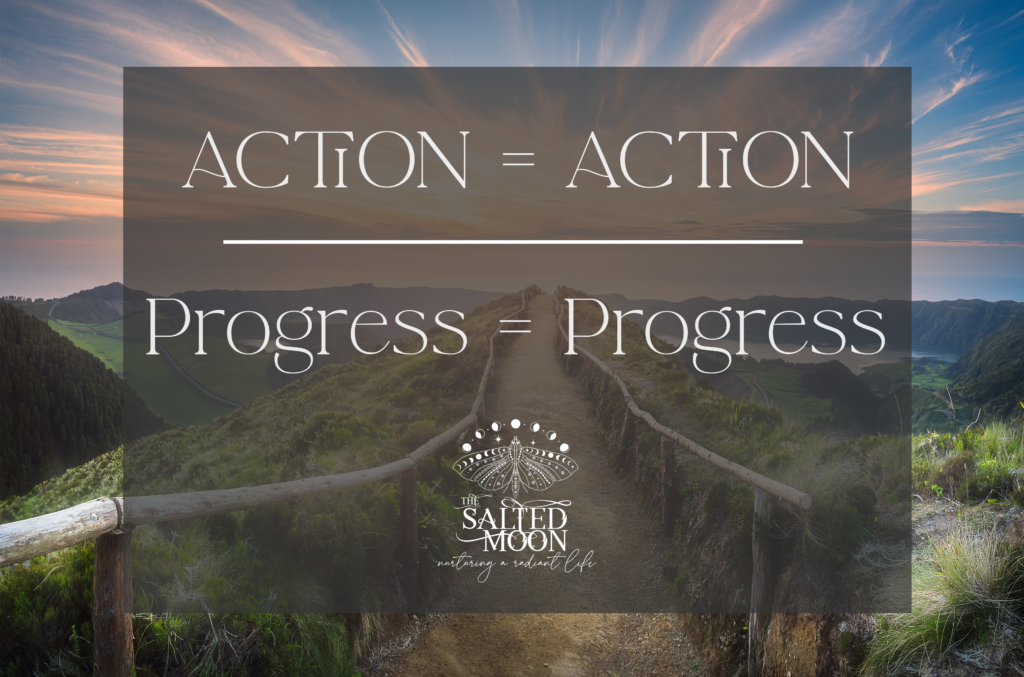You’ve taken the very first step. You’ve imagined your wildest dreams and narrowed down what gives your life meaning and what you’d like to accomplish in your second half.
Maybe you’ve even set some goals and have an action plan roughed out.
But…
You can’t seem to get going.
It’s time to begin. The first step of action breathes life into your dream, and action transforms an abstract wish into reality. With one step, no matter how tiny, you bring your dream out of your imagination and into real life.
Face the Fear – Take the First Step
If that just freaked you out, it’s okay. Even when you’re excited about what lies ahead, it’s easy to feel overwhelmed and paralyzed. Then, when it’s time to take action, it can cause you to gasp and say, “Wait a minute. Am I sure?”
Putting the brakes on is most often rooted in fear. Fear of failure, or the alternative, fear of success. But only action will put fear in its place.
If you’ve been on autopilot for a while and are ready to make a difference for yourself, then you need to take the first step.
Zeigarnik Effect On the First Step
By taking one small action towards your dream life, you set in motion the Zeigarnik Effect.
Bluma Zeigranik, a Lithuanian psychologist, published her research in 1927, theorizing that our brains remember interrupted and incomplete tasks easier and with more intensity than completed ones.
An overwhelming amount of information comes to your brain every second. Therefore, it must be selective on what takes front and center versus what can be tucked away for use later as needed.
Completed tasks, or ones not started, will be kept on the back burner, requiring little effort from your brain while it focuses on essential things.
The things that get put on the big screen of your mind? The tasks, projects, chores, creations, stories, and problems have been started but haven’t concluded.
We have a love/hate relationship with a cliffhanger at the end of a chapter or a Netflix series episode.[1]
Also, why, when you cram for a big test, you may retain the information until the test is over, and then, poof, it’s gone.
Or the reason that your partially organized closet is making cameos in your dreams as a house of horror ready to capture you and swallow you into the abyss.
What This Means For Your First Step
Once you take that first step, the task plays on loop in your brain. What do you need to do next? Tap. Tap. Tap. “Remember me? You haven’t finished over here.”
So, you take action and later come back and take another step. Still, the task is in your mind. Then you take another step until completion.
If you don’t come back to it, it haunts you. Your brain nags you to get back at it.
Turn your big wild dream into a tangible goal, then break it down and down again and again and again.
A glorious goal glimmers as your north star, keeping the Zeigarnik Effect pushing you forward because your brain wants the satisfaction of achievement. And the little steps you take each day, giving you the reward of progress, keep motivation stoked.
Completion and striving for completion.
The Downside of the Zeigarnik Effect
If you’re experiencing much anxiety and frustration about not reaching your goals, dial back the steps to even smaller actions. The sweet spot is small enough that you can accomplish movement towards your goals while enjoying the process and giving your brain enough of a cliffhanger to want to continue on the journey.
A downfall might be the stress of unfinished business and the inability to take a break and give yourself some relaxation and replenish-mode time.
In fact, taking breaks while working towards a specific goal gives you a chance to let things percolate and see if you’re on the right track and reevaluate if necessary.

Waiting To Know Everything
You’ve probably heard the term analysis paralysis by now. And maybe you nod with agreement or roll your eyes.
But here’s the truth: You can never know everything you need to know before you start. You just can’t. Unless you start, you won’t even know where the holes in your knowledge exist.
You can spend a ton of time learning something that, in the end, doesn’t even serve you and what you want to do. And besides, all that knowledge you’ve accumulated isn’t doing anything for you if you aren’t putting it to action.
Action is where you learn and experience life. You’re already taking action; you might not be purposefully going in the direction you want.
Always be learning, know enough to start smart and comfortably, but after that, get going and find out what you need to learn next.
I love learning and being organized and prepared [2], so I have to fight the urge to read, research, and learn myself right out of taking action. It’s futile. I’ll never know everything I need to know. I have enough experience now to know that once I have a basic understanding, the bulk of the knowledge comes from getting my hands in the dirt. That’s called wisdom. Wisdom comes from action.
Confidence After Your First Step
Confidence comes with the thrill of success. And it doesn’t have to be a grand success. But only through doing and seeing the other side of your efforts will you believe how capable you are.
The opposite is also true. Holding back action erodes your confidence. It starts feeding the negative self-talk, and the chatter in your brain begins saying things like, “I told you you couldn’t do this,” or “see, you are a failure.”
Make your first step small and doable to immediately feed the cycle of success. Build your confidence through the doing.
Life is messy, and you will inevitably face challenges and obstacles along with the thrill of progress. But as you overcome these setbacks, your confidence and self-belief will increase. You got this!
Your Supporters
People will join you in your enthusiasm. Others around you will see what you’re doing, take you more seriously, maybe even support and help you out, and cheer you on.
How will others support you if you’re only daydreaming about what you want all the time?
This is a tricky area, though. Sometimes people seem to be out to sabotage your efforts. Honestly, it usually comes from a place of trying to help you stay safe or from their own discomfort, but it’s hard not to let this affect you.
Find people who will support you and cheer you on. Then, because they can’t take a field trip in your brain, take that first step, so they see your actions.
Embracing the Identity
Do you want to be a writer? Put your butt in the chair and start writing. Tada! You’re a writer. Did you publish a 10-book high fantasy series being made into a Netflix original? No. (Not yet.) But you’re a writer. So wear that with pride and get on with it.
As you embrace the identity of your dream life, you will get familiar with the territory. You will see if it fits and feels natural. It may take a while to get completely comfortable, so give it time, but you’ll never know until you take the first step.
Motivation Is Fueled By First Steps
First step = first success. Each small step after that? More success. These little sparks of progress feed motivation.
Start a walking program and see how you feel after moving your body and getting outside. As you notice the small changes, you can appreciate how much you want to continue. The first step in a fresh walking commitment immediately increases motivation.
When I go for a walk/jog, my head is clearer, I drink more water throughout the day, I eat better, my legs feel stronger, consistently I fit my clothes better, my skin glows, and I’m energized. So how’s that for motivation for the next day?
Getting out and actually doing it, even when I have other things to do and don’t think I have time or feel tired and don’t want to bother, reminds me how amazing I feel afterward and how it sets the tone for my entire day. So the first step is just doing it no matter what I feel.
If you’re still feeling stuck, check this out Got Motivation? How to Get Unstuck.
First Steps Are Great Testing Ground
Taking action strengthens your commitment to your goals and dreams or will show you that you need to deviate from the original plan.
You may come across ideas you hadn’t even considered before or new ways to do things that weren’t on your radar. You’ll figure out what does and doesn’t work.
In the beginning, you can test out these new ideas and experiment with less to lose. Taking the first step and making progress helps whittle down the options to only those tasks and ideas that bring your dream life to reality.
The Feel-Good Cycle
Self-discipline and putting off instant gratification while moving towards what you want in life feel good. You’ll start a cycle of feeling good, so you do more things towards your dream life, which feels even better, so you do more—the feel-good cycle.
Your future self–even if it’s your tomorrow self–will be proud. Time goes by whether you’re doing what you want or not. So, putting actions off to some point in the future when (fill in the blank) won’t get you where you want to be.
So, where to start? Your first step shouldn’t be a tedious or difficult task. Do a thing that interests you, is fun, or you’re curious about. Do the thing that is meaningful.
Remembering there is inherent meaning in making progress on your goals and dreams no matter how small the step feels—all progress is worth celebrating and being proud of.
How a First Step Becomes Habit
The first step is the beginning. Obviously, it’s right there in the name. The first step is the beginning of the process, and the process leads to progress.
The more you repeat things, the more they become a habit, the more routine they become, and the less effort you have to take action. Your brain puts them on autopilot. Healthy, beneficial autopilot habits are a good thing.
But it starts somewhere. And then it continues. It starts today—one small step at a time.
Habits begin as purposeful steps taken consistently. For example, meditating as soon as you get out of bed in the morning can become a habit with consistent effort. However, other things can’t become habits because you do them irregularly or only once.
This is especially true of creative work. Make it a habit to put in routine effort, but each day will require new thinking, imagination, and a new part of the creative process. For example, you may have to research, prepare, purchase, explore options, or just rehearse or incubate ideas. The habit is the commitment to creating every single day.
And some tasks are just a once, and you’re done. What can become a habit is taking action regularly.
All-Or-Nothing Thinking
Many people get stuck in the all-or-nothing thinking of pursuing goals and dreams. It can be an easy trap. Why do anything if you can’t do it fully?
Overwhelm is paralyzing. Taking your goals and breaking them down into manageable steps can nip overwhelm in the bud.
Take your big vision and consider what you want to accomplish this year. What would it take to make that happen in monthly chunks? Weekly? What could you do today to move a bit closer to your dreams?
That’s where you start.
And taking the first step happens again and again. Because sometimes, if you don’t see immediate significant results, it’s easy to say the process isn’t working and either forget the entire dream or believe it was too big and brilliant of a dream to begin with.
Make sure your dreams and goals align with what’s important to you and believing and finding joy in the process will keep you steadfast. If you need to see big differences immediately, your all-or-nothing thinking might make you give up and abandon your dreams.
Small steps open the door to the possibilities of your big dreams. Of course, there will be times when it feels like change and growth are stagnant, but they’re just incubating, and staying the course will get you to the other side. And all the little steps add up over time.
What Happens To Sideliners
If you wait until the time is perfect, it’ll never be. You know this through life experience, so I don’t have to tell you. You’re never ready.
And, in case you didn’t notice, it has to be you. No one else is going to make it happen. It all rests on your effort.
Sitting on the sidelines watching the action around you, you’ll always wonder what if. What if you would have started, at least tried, put in the effort, or just had fun giving it a go?
It’s not about sitting down to write the novel. It’s about sitting down to write for 15 minutes, 2000 words, or one chapter. So don’t freak yourself out. Just take the first step.
Time is our most valuable asset. You’ll be so glad you started, so take that first step.

The first step is difficult. What holds you back from taking action on your goals and dreams? What next step can you take to fuel action and progress? I’d love to hear!
[1] I rarely get an opportunity to binge-watch a show, but I watched every single episode of The Good Place back-to-back when my daughter was in the hospital. Thank you, The Good Place, for getting me through those long hours of waiting. You have to watch this series if you haven’t!
[2] I have pages of notes, packing checkoff lists, and an hour-by-hour schedule when I travel. But honestly, planning is one of my favorite parts. It will be an incredible adventure if I enjoy the trip and am flexible when the inevitable happens. That’s life, isn’t it?



